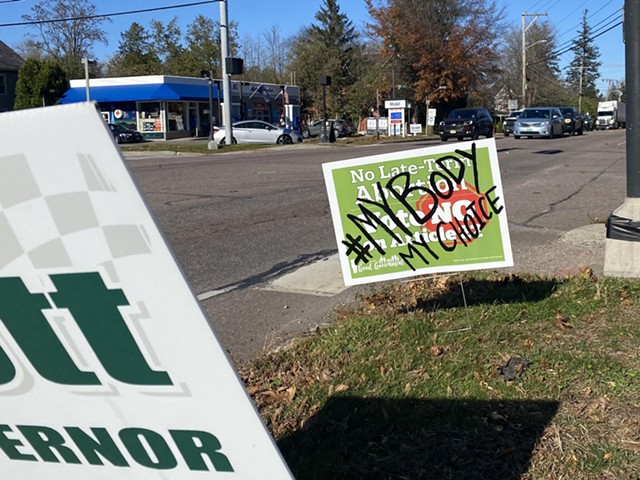Switch to the mobile version of this page.
Vermont's Independent Voice
- News
- Arts+Culture
- Home+Design
- Food
- Cannabis
- Music
- On Screen
- Events
- Jobs
- Obituaries
- Classifieds
- Personals
Browse News
Departments
Browse Arts + Culture
View All
local resources
Browse Food + Drink
View All
Browse Cannabis
View All
-
Culture

'Cannasations' Podcaster Kris Brown Aims to 'Humanize'…
-
True 802

A Burlington Cannabis Shop Plans to Host…
-
Business

Judge Tosses Burlington Cannabiz Owner's Lawsuit
-
Health + Fitness

Vermont's Cannabis Nurse Hotline Answers Health Questions…
-
Business

Waterbury Couple Buy Rare Vermont Cannabis License
Browse Music
View All
Browse On Screen
Browse Events
Browse Classifieds
Browse Personals
-

If you're looking for "I Spys," dating or LTRs, this is your scene.
View Profiles
Special Reports
Pubs+More
Vermonters Approve Amendments to Ensure Abortion Rights and Ban Slavery
Published November 8, 2022 at 10:50 p.m.
click to enlarge 
Vermont voters on Tuesday approved two amendments to the state constitution: one that codifies the right to reproductive freedom and another that eliminates language that allows slavery and indentured servitude.
- Alison Novak ©️ Seven Days
- Graffiti marks a sign opposing Proposal 5 on the Shelburne Town Green
Proposal 5, the reproductive freedom measure that is also known as Article 22, had approval from 72 percent of voters as the vote tally topped 200,000. The amendment specifies that all individuals have a right to "personal reproductive autonomy" that cannot be "denied or infringed unless justified by a compelling State interest achieved by the least restrictive means."
Planned Parenthood Vermont Action Fund declared victory on Prop 5 at about 9:30 p.m.
“Every Vermonter should have the right to make their own reproductive decisions, like whether and when to become pregnant, carry a pregnancy to term, use temporary or permanent birth control, or seek abortion care," said Lucy Leriche, vice president of public affairs for the fund. "Vermont voters stood up for reproductive freedom, for ourselves, our neighbors and future generations.”
Vermont advocates for abortion access started working on the amendment years ago, seeking to protect abortion rights in the face of concerns that the U.S. Supreme Court could overturn Roe v. Wade.
That court’s June ruling in Dobbs v. Jackson Women’s Health Organization leaves it up to the states to decide whether to allow access to abortion. In promoting Proposal 5, the ACLU of Vermont said the constitutional amendment would prevent future state legislatures from restricting reproductive autonomy in Vermont.
Matthew Strong, the executive director of Vermonters for Good Government — a group that was organized in 2019 to oppose an abortion rights proposal — said the campaign had set a goal of raising more than $2 million to defeat Proposal 5, but only got about $700,000.
Related Lasting Changes: Revisions to Vermont's Constitution — Dealing With Slavery and Abortion — Are on the Ballot This Fall

Lasting Changes: Revisions to Vermont's Constitution — Dealing With Slavery and Abortion — Are on the Ballot This Fall
By Kevin McCallum
Election Voter Guide
“I knew this would be a David and Goliath situation, from a political standpoint,” Strong said. He added that the campaign was unsuccessful in its attempts to raise money from out of state, but about 1,500 Vermonters sent in donations.
Former state senator Debbie Ingram began working on Proposal 2, the slavery amendment, when she was in the legislature, and she promoted it as executive director of Vermont Interfaith Action. Mark Hughes, executive director of the Vermont Racial Justice Alliance, was also a strong advocate.
Roughly 82 percent of voters had supported the measure according to the tally reported late Tuesday, which was not complete. Ingram said the support was stronger than she had expected, and she hoped that interest would generate momentum for the groups' other work.
"We want to build on this issue to address systemic racism in criminal justice, in jobs, in education, in so many different areas where we need to make strides," Ingram said.
With the adoption of its 1777 Constitution, Vermont became the first state to ban slavery. But the document left the door open for the practice of indentured servitude, which was then common. When slavery was outlawed nationwide for anything other than conviction for a crime in 1865, the Vermont Constitution seemed to continue allowing forms of slavery for those under age of 21 or under certain financial conditions.
Under Proposal 2, the exemption is replaced with the declaration that "slavery and indentured servitude in any form are prohibited."
Alabama, Louisiana, Oregon and Tennessee also considered proposals on Election Day for voters to remove slavery-related clauses in their constitutions. Colorado, Nebraska and Utah have approved similar ballot initiatives since 2018.
That ballot item didn’t receive as much attention in the run-up to the election. Ingram said a lot of her advocacy work was just telling people that Proposal 2 would be on the ballot.
“Since Vermonters vote so seldom on any kind of ballot initiative, I think most people were kind of surprised,” she said.
Passing a constitutional amendment in Vermont takes several years, and Vermonters have only done it twice in the past 20 years, according to John Bloomer, the secretary of the Senate.
Amendment proposals must be initiated in the Senate and only every four years. They must be approved by two-thirds of its members before they are sent to the House, where a majority must approve them.
Proposals that make it past that process are taken up in the next term of the legislature, giving voters a chance to let their representatives know what they think. Then, a majority of votes in the House and the Senate is required before they are placed on the ballot.
A week after Election Day, the amendments are approved in the canvass, or official tally, attended by the Vermont secretary of state and representatives from Vermont's three major political parties, and become part of the Vermont Constitution after they are signed by the governor and the secretary of state.
Related Stories
Got something to say?
Send a letter to the editor
and we'll publish your feedback in print!
More By This Author
About The Author

Anne Wallace Allen
Bio:
Anne Wallace Allen covers breaking news and business stories for Seven Days. She was the editor at the Idaho Business Review and a reporter for VTDigger and the Associated Press in Montpelier.
Anne Wallace Allen covers breaking news and business stories for Seven Days. She was the editor at the Idaho Business Review and a reporter for VTDigger and the Associated Press in Montpelier.
Comments
Comments are closed.
From 2014-2020, Seven Days allowed readers to comment on all stories posted on our website. While we've appreciated the suggestions and insights, right now Seven Days is prioritizing our core mission — producing high-quality, responsible local journalism — over moderating online debates between readers.
To criticize, correct or praise our reporting, please send us a letter to the editor or send us a tip. We’ll check it out and report the results.
Online comments may return when we have better tech tools for managing them. Thanks for reading.
- 1. Vermont Senate Votes Down Ed Secretary Nominee Zoie Saunders Education
- 2. Governor Makes Last-Minute Appeal to Delay Vote on Ed Secretary Nominee Education
- 3. UVM, Middlebury College Students Set Up Encampments to Protest War in Gaza News
- 4. Dog Hiking Challenge Pushes Humans to Explore Vermont With Their Pups True 802
- 5. Scott Official Pushes Back on Former State Board of Ed Chair's Testimony Education
- 6. Help Seven Days Report on Rural Vermont 7D Promo
- 7. Burlington Budget Deficit Balloons to $13.1 Million News
- 1. Totally Transfixed: A Rare Eclipse on a Bluebird Day Dazzled Crowds in Northern Vermont 2024 Solar Eclipse
- 2. Zoie Saunders, Gov. Scott’s Pick for Education Secretary, Faces Questions About Her Qualifications Education
- 3. Don't Trash Those Solar Eclipse Glasses! Groups Collect Them to Be Reused 2024 Solar Eclipse
- 4. State Will Build Secure Juvenile Treatment Center in Vergennes News
- 5. Vermont Awarded $62 Million in Federal Solar Incentives News
- 6. Queen of the City: Mulvaney-Stanak Sworn In as Burlington Mayor News
- 7. New Jersey Earthquake Is Felt in Vermont News










































